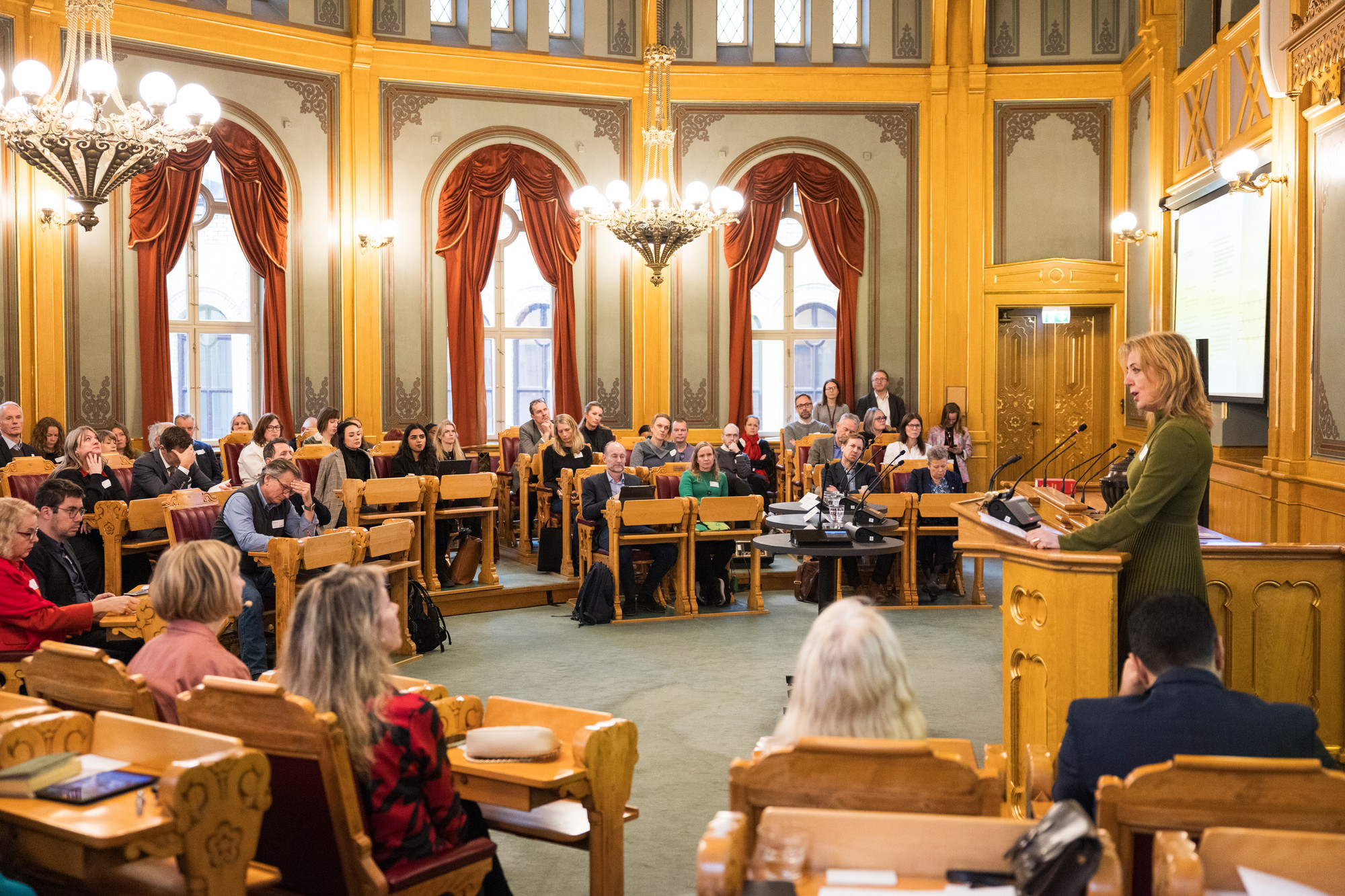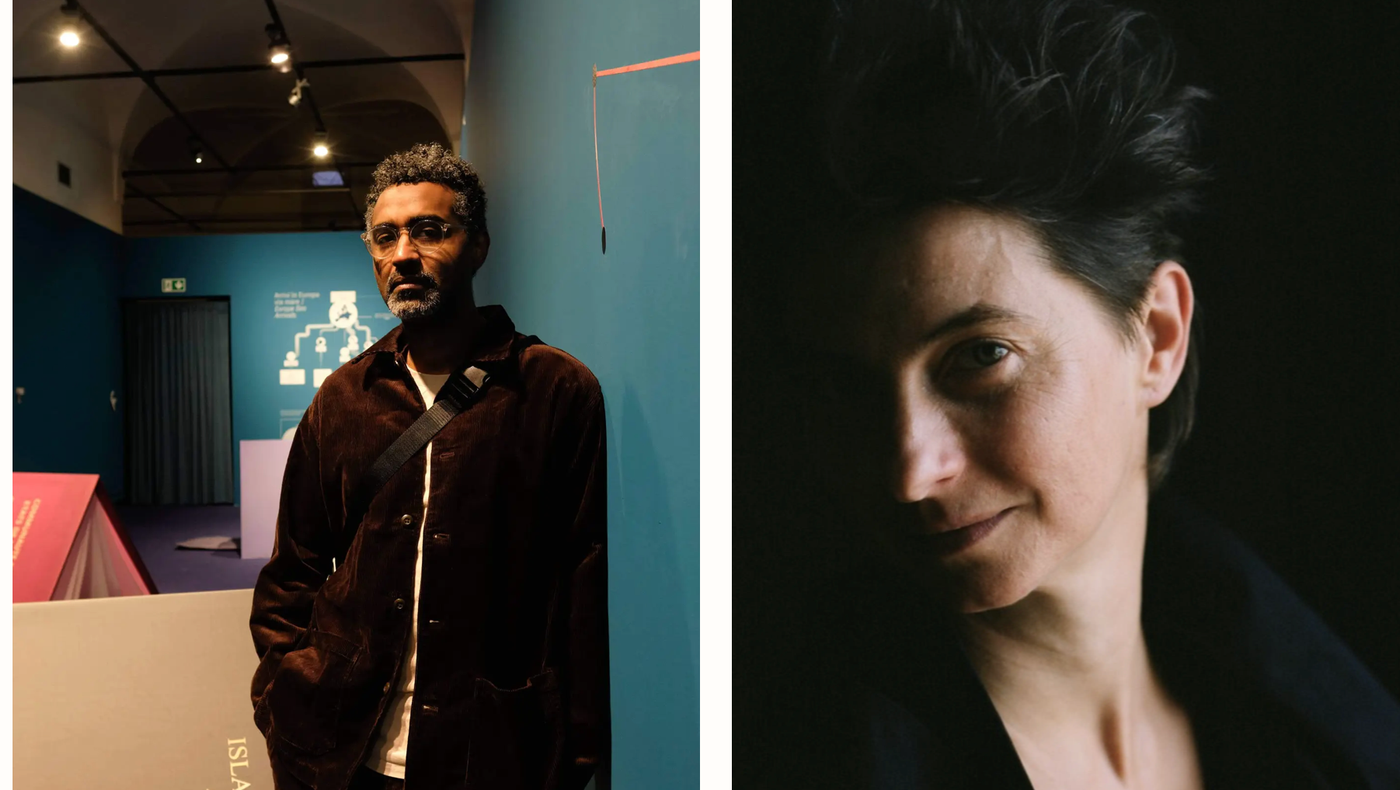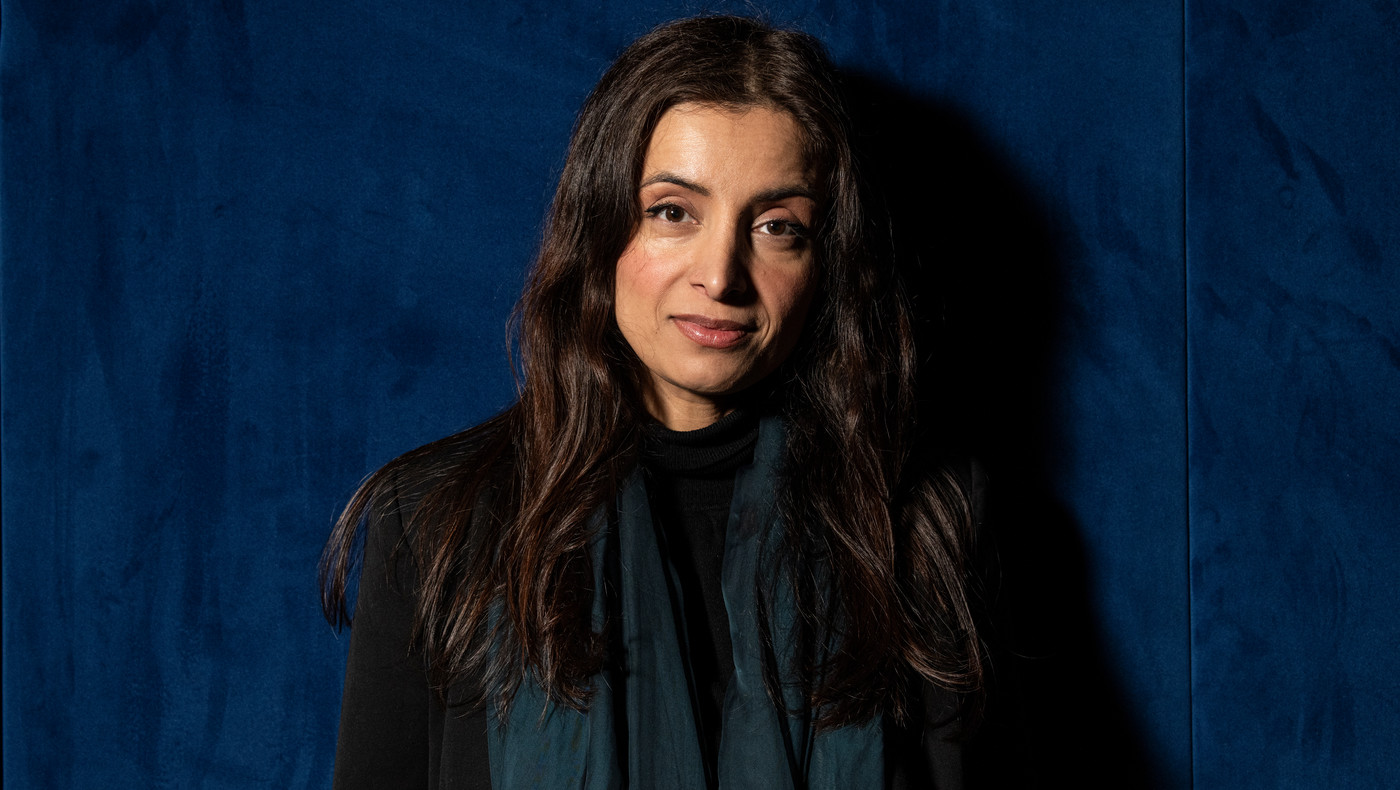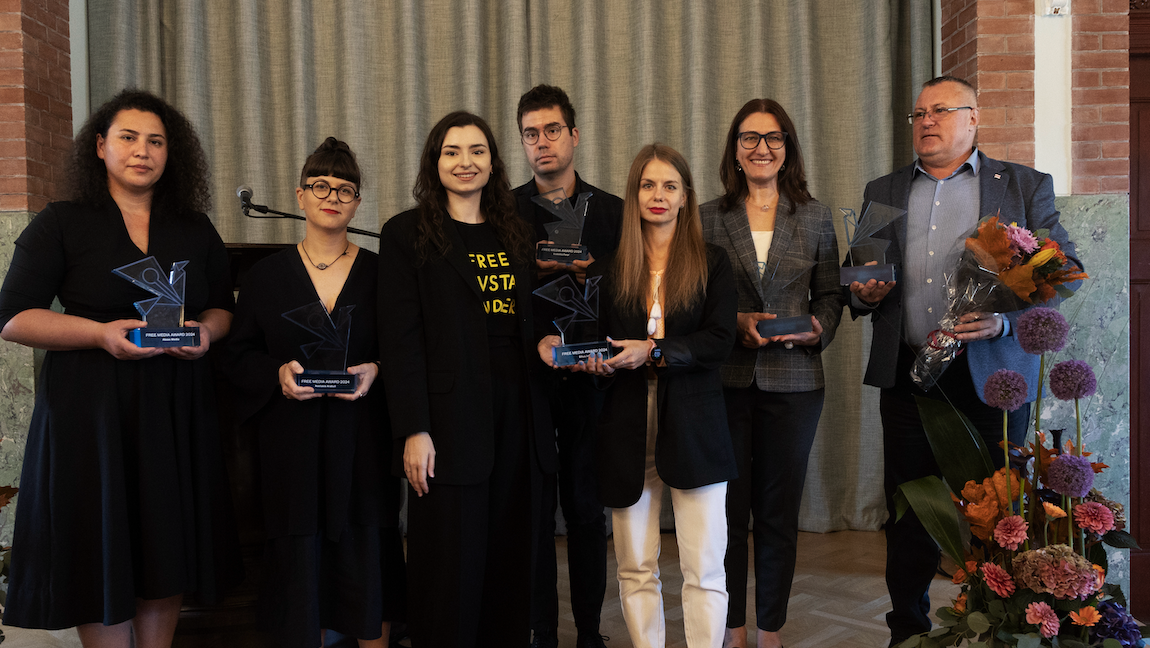Seminar on freedom of expression at the Norwegian Parliament: "Stop talking about technology platforms as though we have no way to control them.”
“It is possible to regulate technology platforms”, stated former Minister of Culture Trine Skei Grande on 19 November, when the Presidium of the Storting invited the public to a seminar on freedom of expression.
“We are not without options for exercising control”
To protect freedom of expression in a digital era, it is important that we dare to regulate the international technology platforms and social media, and that we are on the alert for the negative effects of artificial intelligence and deep fakes.
How does free speech in today’s political climate in Norway compare with the situation of yesteryear? Does technological development promote or inhibit freedom speech? How has this development impacted Norway as part of Europe?
These were among the questions that three panels of politicians and journalists, and three sets of speakers and politicians discussed and answered at a seminar on the conditions for freedom of expression on Thursday, 19 November.
The seminar was organised on the occasion of Fritt Ord’s 50th anniversary and to commemorate that the first Freedom of Expression Commission in Norway was appointed 25 years ago.
See a recording of the entire seminar
Freedom of expression has been under pressure
“Regrettably, the global status for freedom of expression is not good”, according to Storting President Masud Gharahkhani.
Among other places, he mentioned Iran, the country of his birth. Gharahkhani stated that freedom of expression is key both because it gives individuals a sense of freedom and because it facilitates the building of good democracies and the best possible societies.
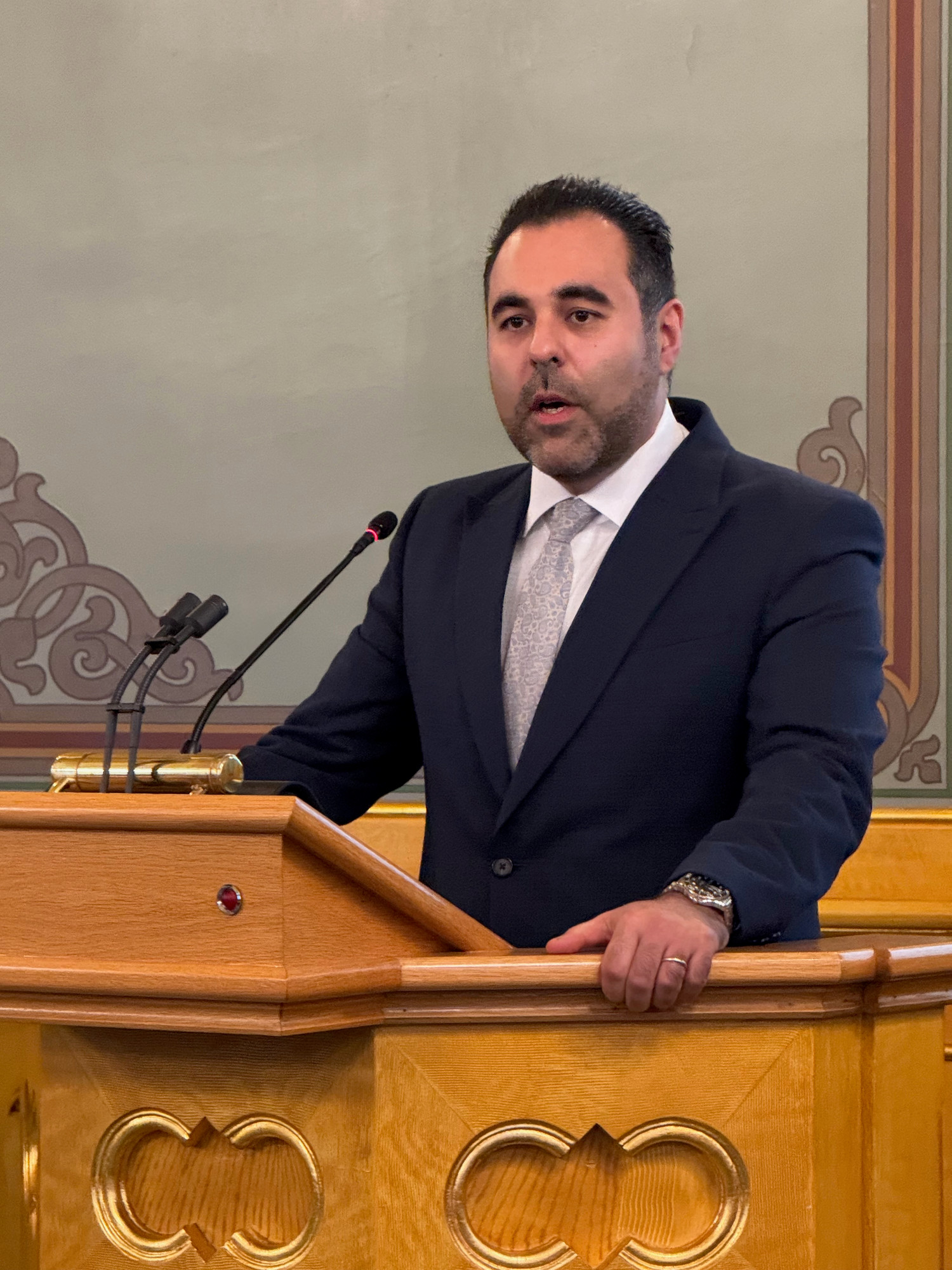
Grete Brochmann, chair of the Fritt Ord Foundation Board, followed up by pointing out that, over time, freedom of expression per se has “become a controversial topic” in Norway and abroad.
“Freedom of expression is surrounded by considerable unrest, including intensified religious conflicts.”
She emphasised that it is important to bear in mind the general principles that apply when deciding which utterances should be allowed and which should sometimes be restricted, and not to allow this to depend on where one stands in an individual debate.
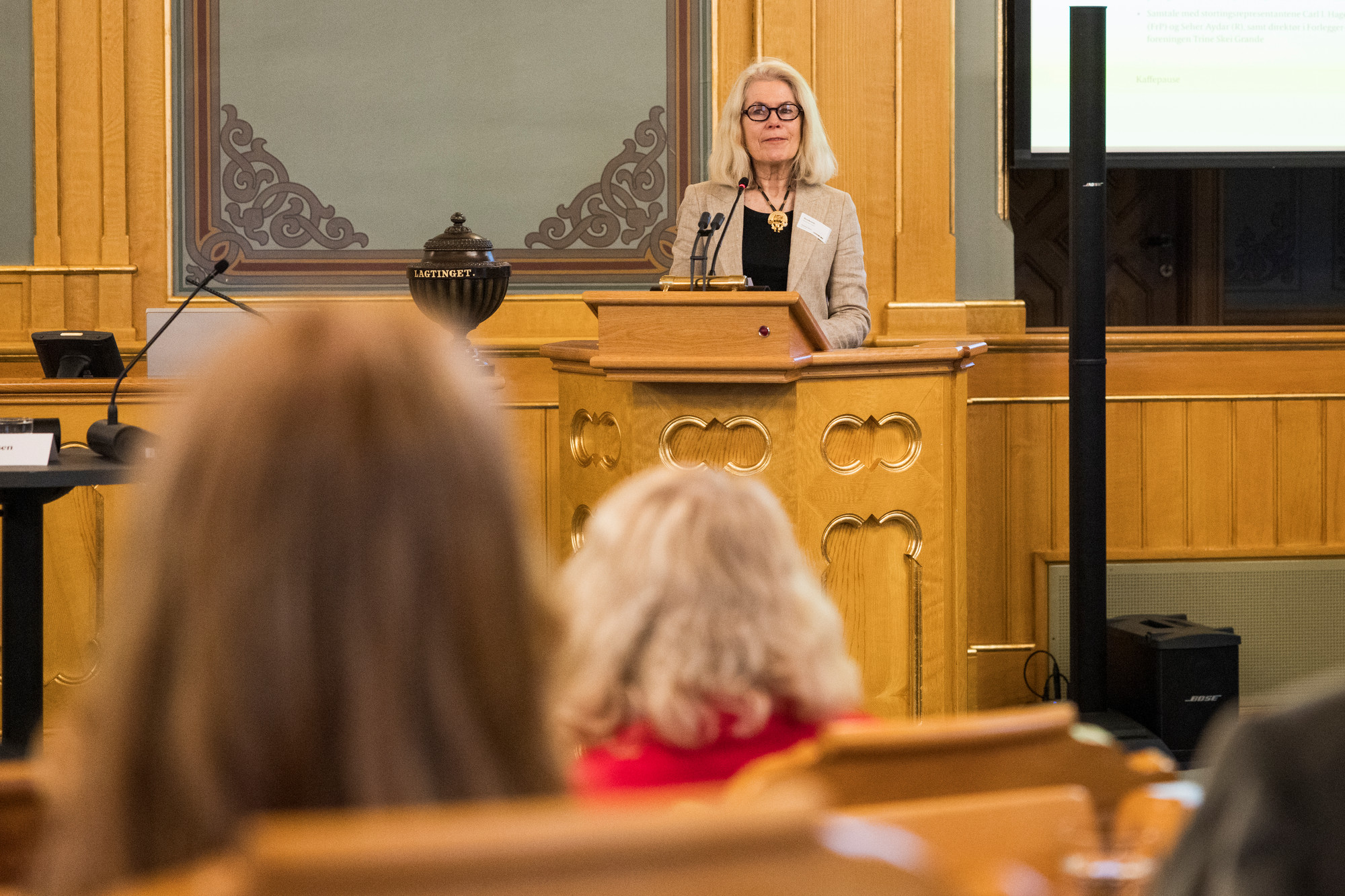
Kjersti Løken Stavrum, chair of the Freedom of Expression Commission, reminded us that “conditions are good for freedom of expression in Norway”.
“That was the main conclusion of our report. That came as a surprise in the world’s most democratic country with full freedom of the press, at a time when the debate in Norway seemed to have left the facts behind, and there was hardly any research on the favourable aspects of the revolutionary change that had taken place in relation to freedom of expression in Norway since the first Commission published its report.
“In particular, the general framework conditions are good”, she pointed out, “including good legislation, public scrutiny, good digital skills and good reading skills.”
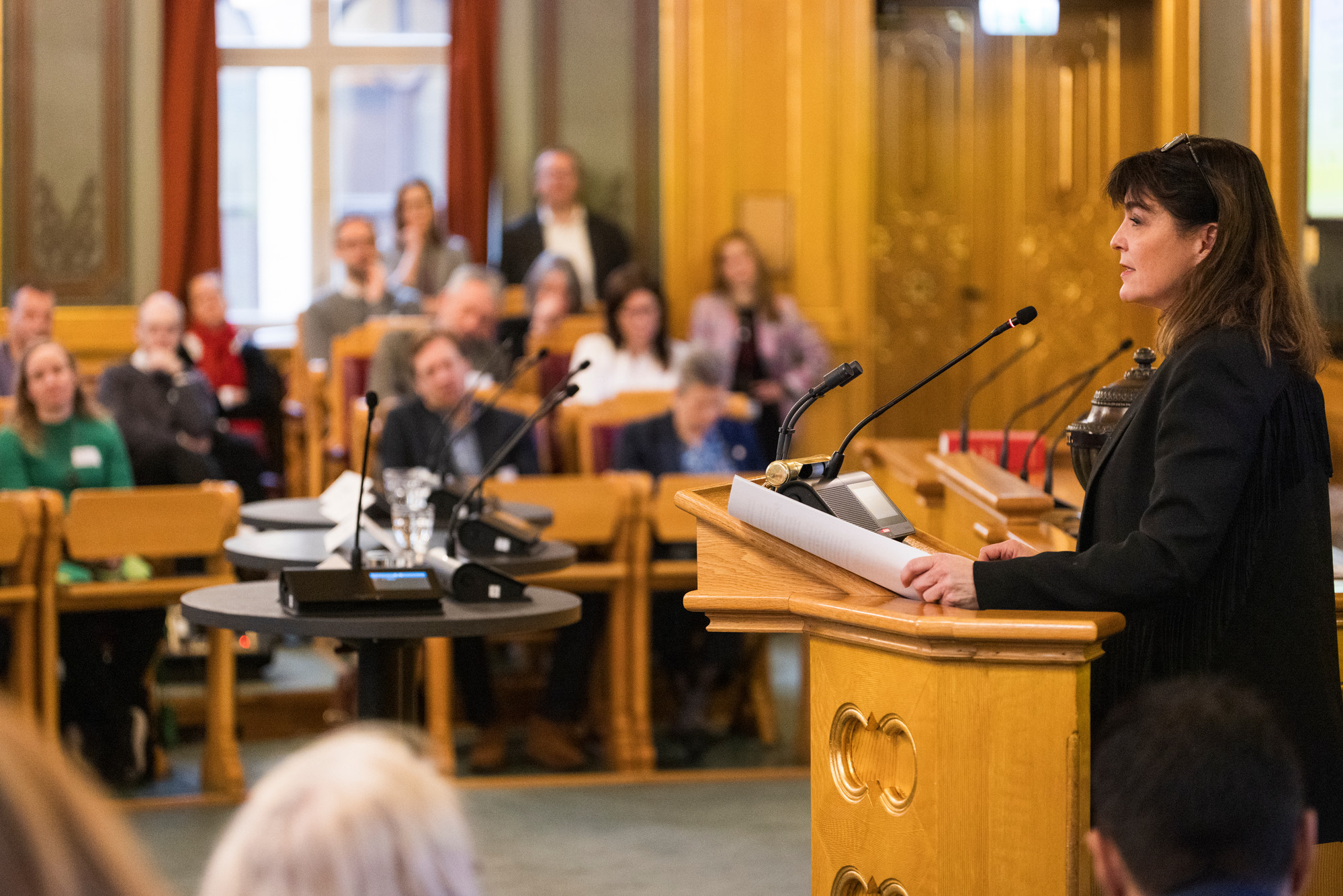
Consequently, Stavrum warned against a negative culture that suggests there is a lack of freedom of expression.
“That being said, there is always room for improvement. For Norway, the question is how we can continue to be a beacon. The trials of our time are therefore psychosocial. It is important to take this seriously. What we believe the situation to be and how it actually is will influence our willingness to regulate and to sanction”, she continued.
“The State bears no responsibility for our freedom of expression. The State simply facilitates it. It is important to remember that freedom of expression is a human right, not merely a constitutional right. However, we are of the opinion that tolerance and diversity should be part of the justification for freedom of expression. That proposal received strong show of support during the round of consultative hearings.”
Even Freedom of expression extremists want to regulate technological platforms
Among the topics that Carl I. Hagen (Party of Progress), Trine Skei Grande (Liberal Party) and Seher Aydar (Red Party) could agree on wholeheartedly were the regulation of digital platforms, the advantages of the fact that political parties in Norway can disagree completely, but conduct discussions with integrity, and the importance of physical, face-to-face meetings for accomplishing this, as opposed to casting aspersions at each other on digital platforms.
“I have challenged people who have written unpleasant comments on social media to read their posts out loud to me”, recounted Grande, and they cannot bring themselves to do so.
Aydar uses himself and his relationship to Hagen as a personal example.
“Naturally, I grew up seeing you in the headlines. I had opinions about you and felt that you had opinions about me. But here in Parliament, we have met each other with respect. We have served on the same committees and yes, we have even been united in minority positions”, remarked Aydar.
“We need to see people for who they are and not for how they are presented in the headlines.”
Even the self-declared ‘free speech extremist’ Carl I. Hagen felt that Norway is overly cautious about regulating social media.
“It is obviously bad when someone writes something on Facebook and is then kicked off Facebook without ever learning why”, he said.
“We are otherwise very good at regulating.”
bq. “Naturally, it sounds rather strange that I of all people am in favour of regulation, but in fact, I am”, said the grand old man of the Party of Progress, drawing a comparison between free speech back when he was a political outsider and today.
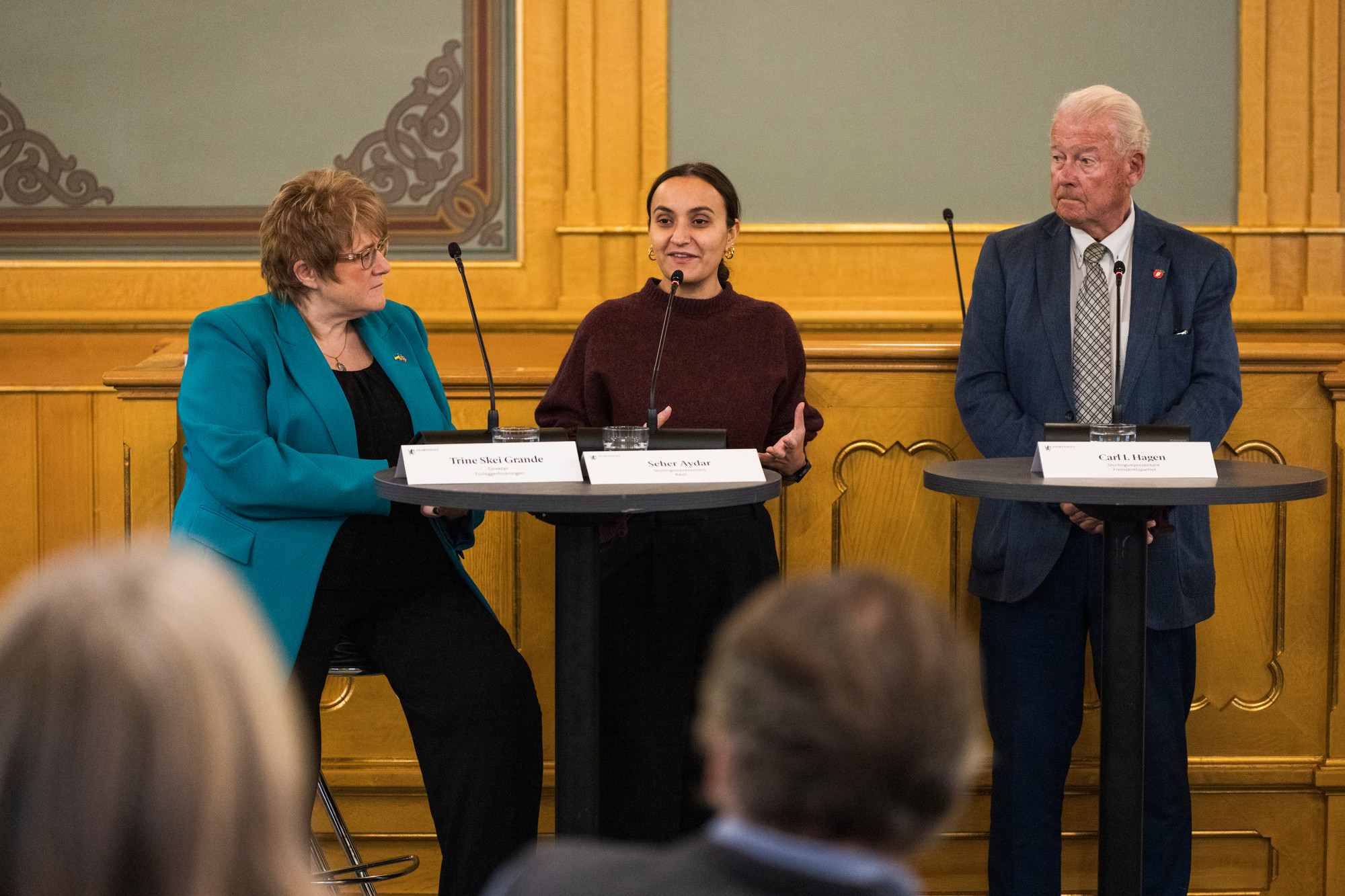
Giving up too easily when we should regulate
The Liberal Party’s Skei Grande, currently chair of the Norwegian Publishers’ Association, took the initiative for the second Freedom of Expression Commission when she was minister of Culture. She also felt that elected representatives often “give up too easily in the face of the major platforms”.
bq. “Stop talking about technology platforms as though we have no way to control them People used to claim that it was not possible to levy value added tax on services, but now that is a reality. It is also possible to regulate technology platforms”, said Skei Grande.
Pond scum and enemies of the State – the press and freedom of expression under pressure in Europe
Investigative journalist in Direkt36 and editor of Vsquare.org Szabolcs Panyi (Hungary) and editor-in-chief of the SME Daily Beata Balogova (Slovakia) discussed freedom of expression in Central and Eastern Europe with Lise Christoffersen (Labour Party) and Siv Mossleth (Centre Party), in a discussion moderated by journalist Amund Trellevik.
“Both of us come from countries with a short history of being independent democracies with a free press. Our prime minister, Viktor Orban, considers the media to be part of the political party machinery, and he believes he should be in control of it”, explains Panyi.
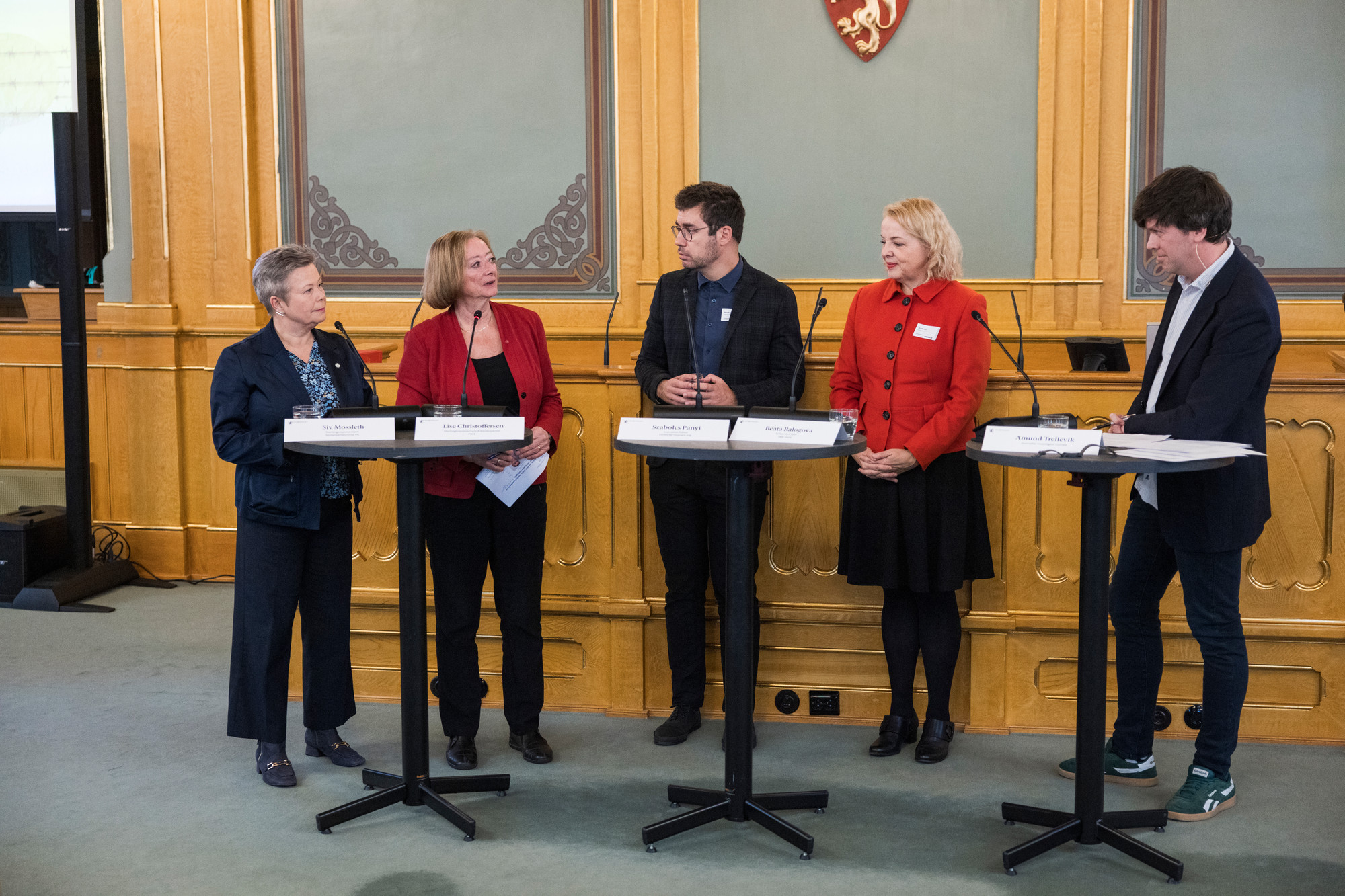
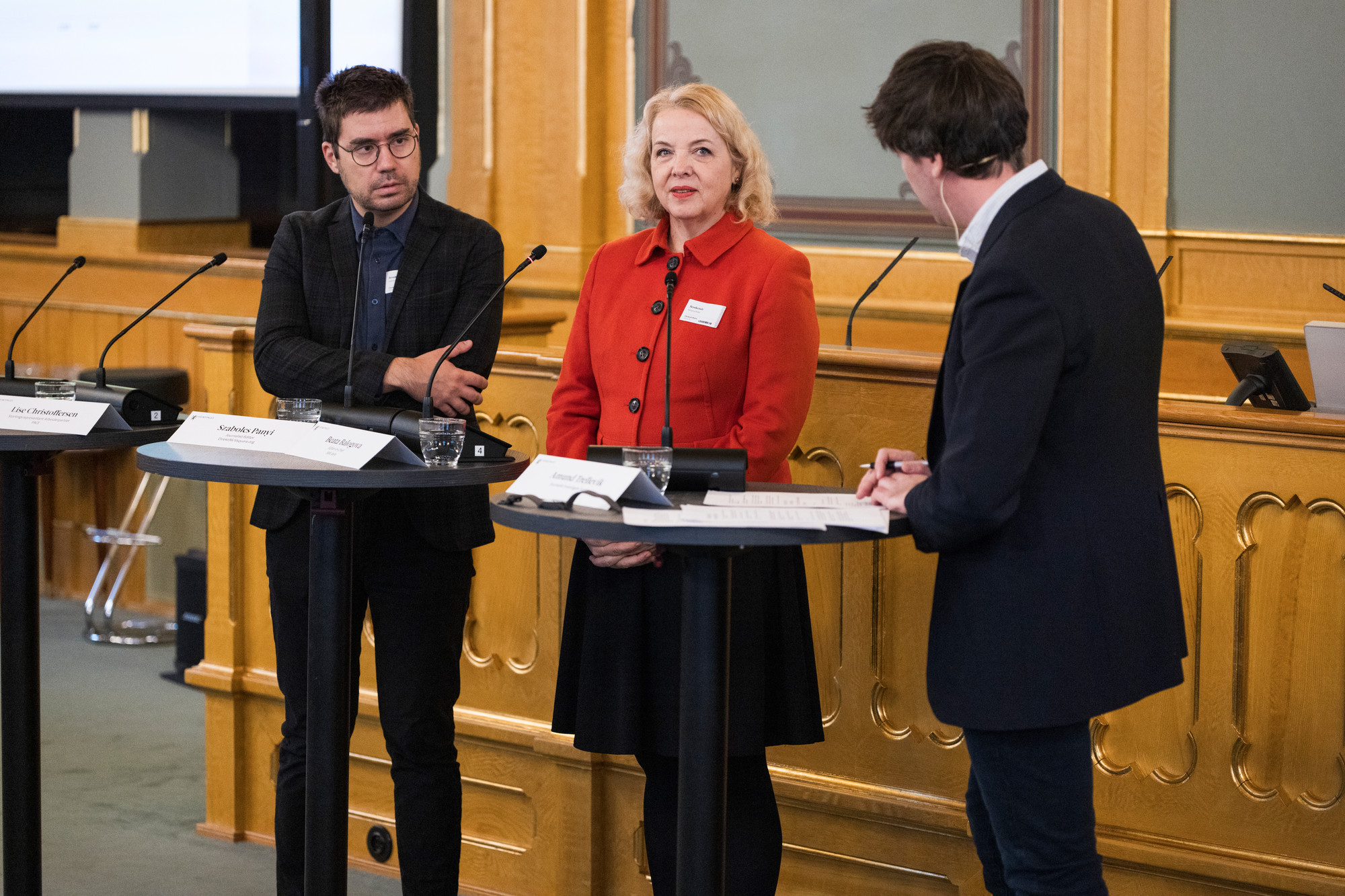
According to Panyi, today, Orban can tell the major media outlets what to write and what not to write each week. Balogova explained that Slovakia’s Prime Minister Róbert Fico follows the same pattern as Obran. Both authoritarian regimes actively oppose a free press.
Balogova says that she has been called an ‘enemy of the State’, ‘a prostitute’ and ‘pond scum’ by the authorities, and Panyi has been given all manner of labels from ‘CIA agent’ to ‘homo lobbyist’. Both added that this is the price they pay for being critical and independent.
bq. "In Hungary, the media can no longer write freely. There is still freedom of the press in Slovakia, but Fico has not given interviews for 15 years. He has built his own media empire to avoid dealing with the free press.”
She warned that this pattern may be used by other strong leaders and that the pattern could repeat itself in other countries, even in Norway.
“Perhaps someone here may even be inspired one day.
“Authoritarian regimes are like contagious diseases. If one state accepts autocracy, others may follow suit quickly”, Mosslet added.
When asked whether Norway could help by providing financial support, Panyi replied that money from abroad will not solve the challenges in Hungary.
“I was very grateful for the moral support from Nordic colleagues when it was revealed that I was being subject to surveillance through the system called Pegasus. But free media cannot rely on foreign investors or donors. The US election results illustrate that. We must rely on our own readers and convince them that independent journalism is crucial for them.”
Technology and freedom of expression
Technological optimism is over
Kjersti Thorbjørnsrud, a researcher at the Institute for Social Research, pointed out how many in Norway were early to adopt smart phones, optimistically and indiscriminately, in the middle of the 00s, a paradigm shift in our technological history, as social media made their debuts. One after the other, we got Facebook, YouTube, Snapchat, Instagram and TikTok.
bq. “It was a time of optimism about technology. In retrospect, it was quite remarkable. Norway’s Police Security Service (PST) was the first security service in the world to be on Facebook. It was not long before the police were on Twitter. All the main cabinet ministers and ministries created an online presence. Little thought was given to the terms and conditions, data protection, rules for distribution or how these platforms were actually controlled”, stated Thorbjørnsrud.
She reminded us of the fundamental elements underlying freedom of expression. She warned that parts of the infrastructure of freedom of information are secret at present, inasmuch as their ownership lies with private global companies.
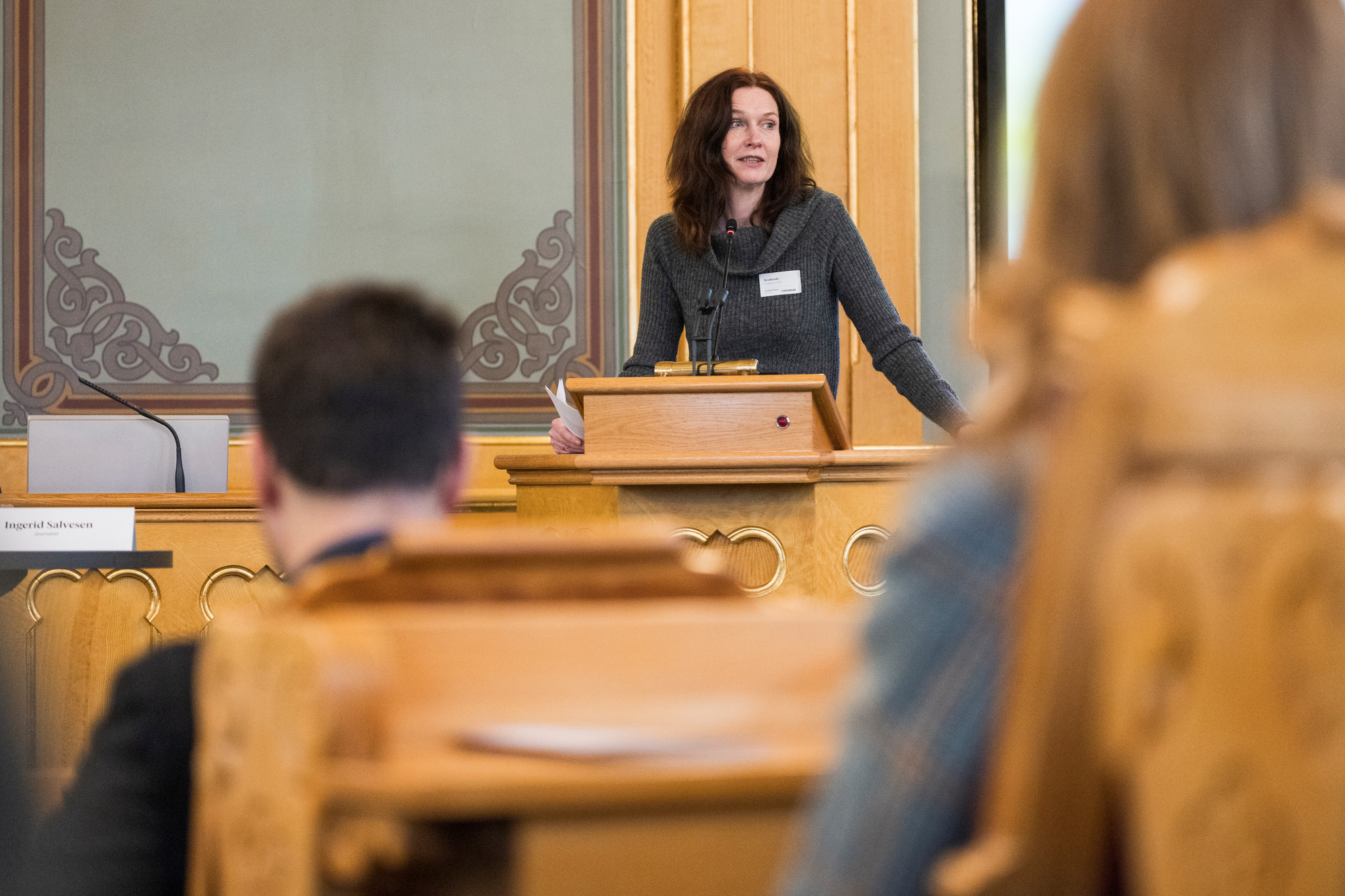
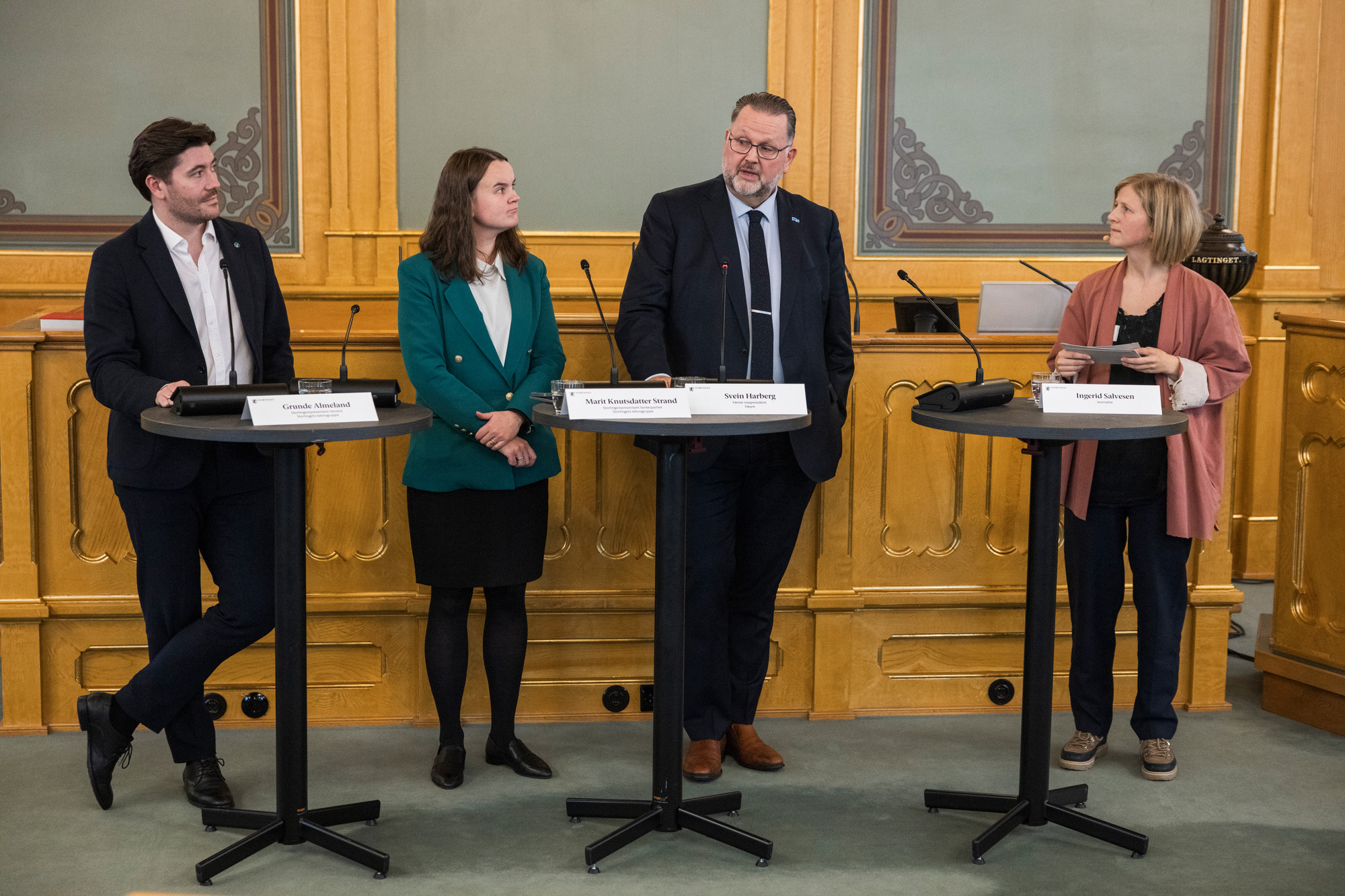
Tore Tennøe, director of the Norwegian Board of Technology, an independent agency that studies questions for the Norwegian Parliament, mentioned that truth and facts are on a slippery slope in the digital world.
Tennøe talked about ‘the ’explosive political force’ in both artificial intelligence and deep fakes, since lies and fictitious statements have an advantage (‘liars’ dividend’) relative to when stories first go viral. The examples are myriad, e.g. ranging from when, according to AI-generated posts, Prime Minister Mette Fredriksen of Denmark wanted to do away with Christmas, to several videos in the run-up to the election between Kamala Harris and Donald Trump in the US.
The distinction between satire and propaganda can sometimes be difficult to distinguish.
“Misleading AI-generated information did not influence the outcome per se, but it did influence the debate in the US”, commented Tennøe.
It can also be hard to tell when foreign powers are behind posts.
“Generative artificial intelligence can turbocharge a message from actors on the outside, and Norway should set up a group to monitor disinformation originating with foreign actors”, stated Tennøe.
The Norwegian Board of Technology advised elected representatives in Norway to avoid allowing technology to destroy debates in Norwegian politics:
- Make rules for AI-generated content
- To the parties: Make rules for artificial intelligence in election campaigns
- Put more effort into fact checking
- Create a psychological defence
Norway can lead the way toward greater transparency
In a debate among politicians from the Storting’s technology group, Vice President Svein Harberg (Conservative Party), Marit Knutsdatter Strand (Centre Party) and Grunde Almeland (Liberal Party), Almeland pointed out that a great deal is already regulated, referring inter alia to the EU’s Digital Services Act.
“It is very important not to talk about this as though it is not regulated. Of course, we can always adapt, and learn from our experience with GDPR. At that time, we got very correct rules from the Liberal Party’s point of view, but they were hard to follow”, he commented.
Harberg was concerned about transparency and expressed the hope that Norway could be at the forefront of this, also when it comes to technology.
“A group in Norway is currently developing artificial intelligence sans so-called black boxes, i.e. technology that is completely open, meaning that no one can patent it. That would guarantee the transparency we need”, he said.
